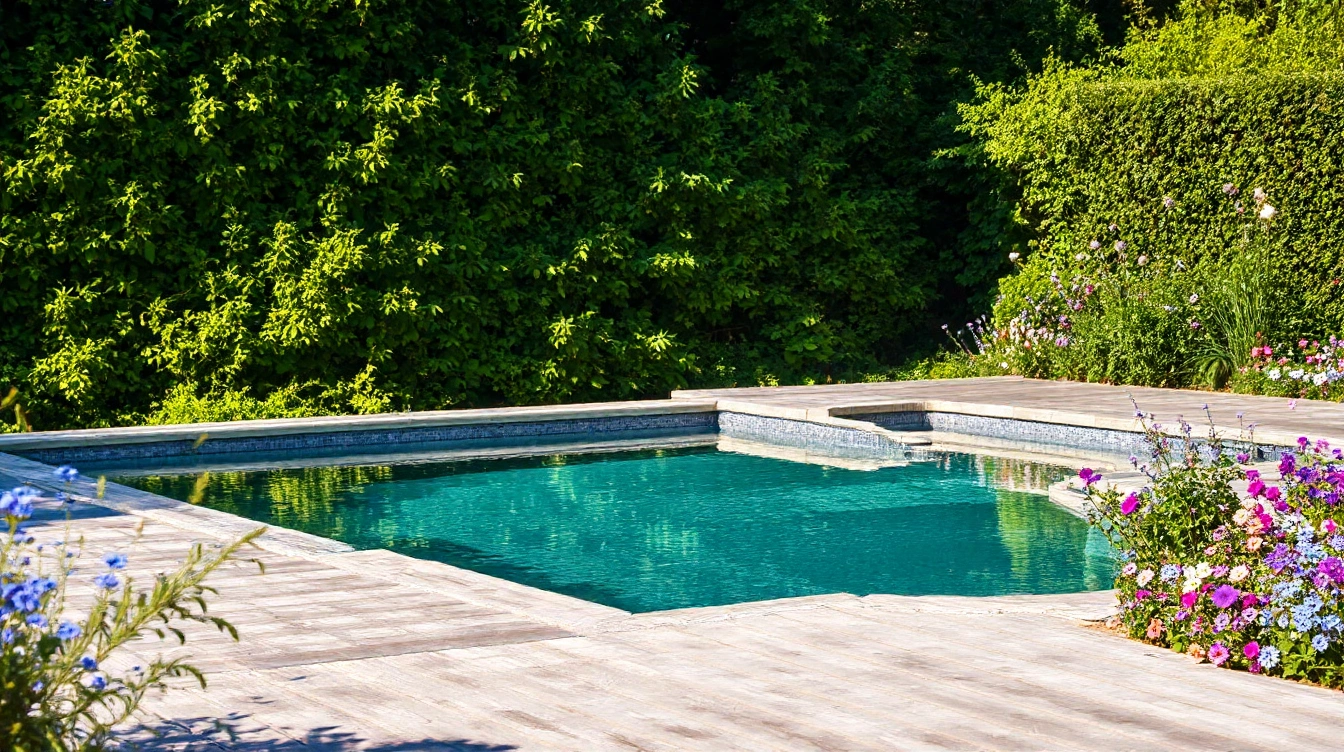Essential Principles of Eco-Friendly Pool Design in the UK
Balancing sustainability with practicality in British climates
The foundation of eco-friendly swimming pool design UK lies in adapting to Britain’s unpredictable weather and environmental standards. Sustainable pool design must prioritize energy efficiency, water conservation, and minimal ecological impact. Choosing the right size is crucial; smaller pools reduce water use and heating demands, aligning with environmental considerations UK standards.
Also read : How Can a Home Swimming Pool Enhance Your Property Value?
Placement and orientation have direct effects on natural heating and lighting. Positioning a pool to maximize sun exposure can lower energy needs for water heating, a core goal in sustainable pool design. Additionally, using natural shading or windbreaks reduces the pool’s exposure to elements that increase maintenance and energy use.
Current trends favor integrating pools with natural landscaping and using renewable energy sources such as solar heating. Eco-friendly materials and advanced filtration systems that minimize chemical usage also dominate UK pool designs now. Homeowners in the UK must consider these aspects carefully to ensure their pool is both environmentally responsible and tailored to local conditions, thereby achieving genuine sustainability in pool design.
Have you seen this : Is Installing a Swimming Pool in Your UK Home a Cost-Effective Choice?
Choosing Sustainable Materials for Pool Construction
Selecting sustainable pool materials UK is a crucial step in reducing environmental impact during pool construction. Opting for recycled pool materials like reclaimed timber and recycled glass tiles can significantly lower the carbon footprint. These materials often come from local sources, supporting regional economies and minimizing transport emissions—a key aspect of low-impact pool construction.
In the UK, eco-friendly options include sustainably sourced hardwoods for decking and natural stone quarried nearby. Using these materials not only enhances durability but also ensures that pools withstand local weather conditions efficiently. This reduces frequent repairs and extends pool lifespan, aligning with sustainable principles.
Maintenance plays a vital role in sustainability. Choosing surfaces resistant to algae and wear minimizes the need for chemicals and energy-intensive cleaning, promoting eco-conscious upkeep. Incorporating permeable paving around pools allows rainwater absorption, further benefiting the environment.
By focusing on recycled, locally-sourced, and long-lasting materials, designers can create pools that represent both luxury and ecological responsibility. This approach embodies the best practices in sustainable pool materials UK and demonstrates commitment to green building.
Implementing Energy-Efficient Heating and Filtration Solutions
Efficient pool heating in the UK increasingly relies on energy-efficient pool heating UK methods like heat pumps and solar thermal systems. Heat pumps extract warmth from the air, using minimal electricity to maintain comfortable water temperatures year-round. Solar thermal panels capture sunlight directly, providing a renewable way to heat pools without ongoing fuel costs. Combining these with proper pool cover insulation minimizes heat loss and reduces energy demand.
Eco pool filters also play a vital role. Designed as eco pool filters, these systems use advanced technologies to optimize water circulation while consuming less power. Variable-speed pumps and fine filtration media contribute to cleaner water and lower energy bills. Choosing a high-quality filter supports both pool hygiene and sustainable operation.
Integrating renewable energy for pools extends beyond heating. Solar panels and wind turbines can power pumps and filtration systems, drastically cutting carbon footprints. This integrated approach maximizes efficiency by aligning energy input with pool demands.
By combining heat pumps, solar thermal solutions, insulating covers, and smart filtration, pool owners in the UK can achieve a green, cost-effective swimming experience. This strategic implementation supports long-term savings and environmental responsibility.
Strategies for Water Conservation and Management
Smart practices for sustainable pool care
In the UK, water conservation swimming pools is essential due to variable rainfall and environmental concerns. Covering swimming pools when not in use is a highly effective pool water-saving tip; pool covers significantly reduce evaporation, cutting water loss by up to 50%. Additionally, preventing leaks by regular inspection and maintenance ensures minimal water wastage—a simple yet often overlooked strategy.
Efficient backwashing schedules are critical. Over-backwashing drains water needlessly; optimizing cycles based on pool type and filter condition balances cleanliness and conservation. Leveraging rainwater harvesting pool systems can further reduce reliance on mains water. Collecting and storing rainwater, then filtering it for pool top-ups, works well in UK climates if appropriately sized collection areas and storage are used.
Innovative technologies, such as automated dosing and humidity control around pools, decrease evaporation rates. Encouraging habits like promptly covering pools and avoiding unnecessary top-ups also play a direct role in conserving water. Together, these strategies form a robust approach to managing pool water sustainably and responsibly.
Alternatives to Traditional Pool Chemicals
Exploring safer and eco-friendly options
When considering natural pool cleaning UK, several effective chlorine alternatives stand out. Saltwater systems use a salt chlorinator to produce chlorine at lower concentrations, offering gentler water treatment. This method reduces harsh chemical use while maintaining water clarity and hygiene. Ozone and UV sterilisation technologies serve as powerful sanitizers by neutralizing bacteria and viruses without relying heavily on traditional chemicals.
Biological filtration is another promising approach. It employs beneficial bacteria to break down organic matter, mimicking natural swimming pool ecosystems. These systems align well with low-chemical pool maintenance goals, reducing dependence on synthetic agents. True natural swimming pools create self-sustaining environments with plants and microorganisms that purify water biologically, ideal for eco-conscious UK homeowners.
Eco-friendly, UK-approved pool chemicals provide safer alternatives as part of maintenance routines. These chemicals are thoroughly tested to ensure minimal environmental impact and user safety while effectively controlling algae and pathogens. Adopting these approaches supports health, sustainability, and the long-term enjoyment of pool facilities.
Eco-Conscious Pool Landscaping and Surroundings
Sustainable pool landscaping in the UK begins with selecting native pool landscaping UK plants. These species are naturally adapted to local climate and soil, reducing water and maintenance needs while enhancing the pool area’s natural beauty. Choosing sustainable poolside plants like wildflowers, ferns, and grasses supports local wildlife, creating a wildlife-friendly pool environment beneficial to insects, birds, and small mammals. This approach not only boosts biodiversity but also reduces reliance on chemical fertilizers and sprays harmful to ecosystems.
Incorporating wildlife corridors and nesting spots around the pool encourages natural behaviors and fosters a balanced habitat. Permeable paving, a key element in sustainable hard landscaping, helps manage rainwater by allowing it to seep into the ground, reducing runoff and potential water pollution. Materials such as gravel, porous concrete, or wood chips are excellent choices, blending utility with eco-consciousness.
Opting for a combination of these elements—native plants, thoughtful habitat creation, and permeable surfaces—creates a serene, sustainable pool area. This careful design respects the environment while offering a lush, inviting retreat that thrives naturally and minimizes environmental impact.
Navigating Regulations, Costs, and Certifications in the UK
Understanding UK swimming pool regulations is essential for anyone considering a pool installation. These regulations encompass building codes, safety requirements, and environmental standards designed to protect both users and the ecosystem. For example, local authorities enforce strict guidelines on drainage and waste management to minimize environmental impact, while ensuring pools comply with safety barriers and lifeguard provisions.
When comparing costs, traditional pools often have lower upfront expenses but incur higher ongoing energy and maintenance costs. In contrast, sustainable pool costs might be higher initially due to investments in energy-efficient pumps, solar heating, and eco-friendly construction materials. However, these pools reduce long-term expenses and environmental footprints, making them financially and ecologically smarter choices.
Eco pool certification UK programs, such as the Green Swimming Pool Standard, provide recognised eco-certifications that verify a pool’s sustainability credentials. These certifications assess water conservation techniques, energy efficiency, and the use of non-toxic materials. Achieving such certifications not only enhances pool value but also aligns with environmental responsibilities increasingly demanded by UK regulations.
By navigating these regulations, understanding cost dynamics, and selecting certified options, pool owners can make informed, sustainable decisions.
Real-World Examples and Visual Inspiration
Exploring eco-friendly pool case studies UK reveals diverse approaches to sustainability. One standout project uses a natural filtration system powered by aquatic plants, reducing chemical use while maintaining crystal-clear water. Another sustainable pool integrates solar heating and LED lighting, significantly cutting energy costs. These examples highlight how combining technology with nature benefits both the environment and the pool owner.
Visual pool inspiration is essential when planning your own eco-friendly pool. Designs often emphasize natural landscaping, such as native plants and stone pathways, which blend pools seamlessly into their surroundings. Modern systems like automated water-saving controls and eco-friendly construction materials also feature prominently. This visual and technical synergy boosts aesthetics and sustainability.
For those aiming to start sustainable pool projects, consulting with professionals specializing in eco designs ensures tailored solutions. Experts provide insights into materials, energy-efficient systems, and maintenance protocols that prolong pool life and minimize environmental impact. With these resources, anyone can create an attractive, eco-conscious oasis that complements their UK setting perfectly.









